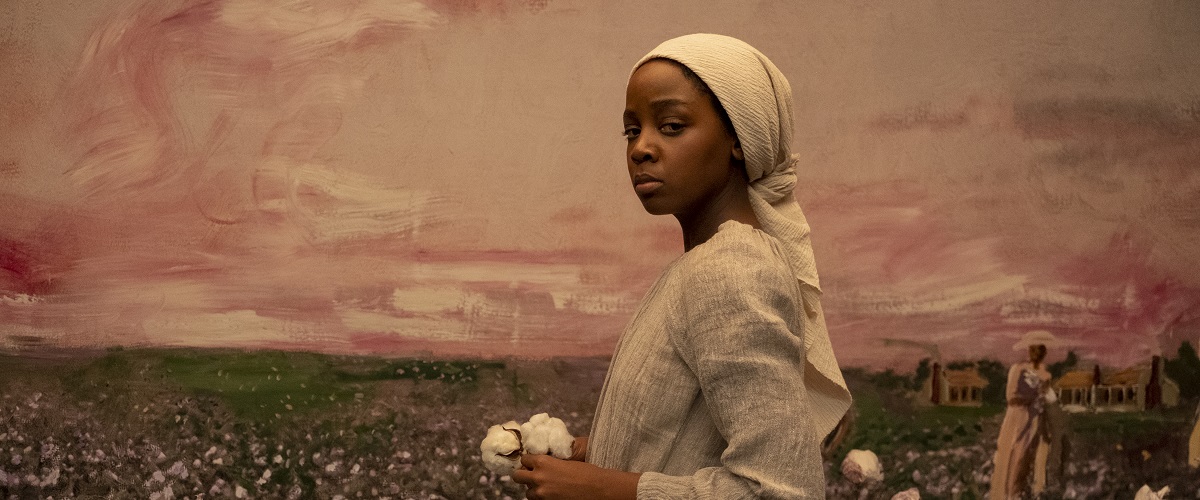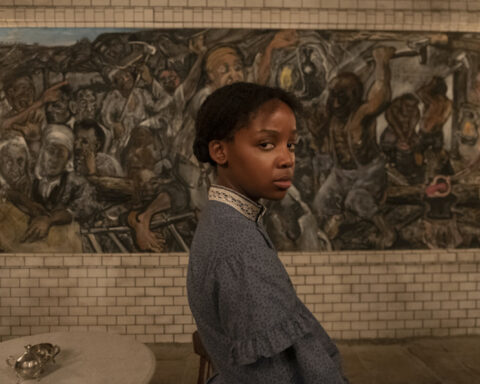“The Underground Railroad,” premiering against the backdrop of America’s current national reckoning on the politics of race, offers a luminous, troubling, artistically sophisticated and emotionally wrenching journey into racial slavery that reveals the peculiar institution’s continuous grip on our national soul.
Based on Colson Whitehead’s acclaimed and popular 2016 novel, “The Underground Railroad” tells the story of Cora (Thuso Mbedu), a Black teenager living under the yoke of slavery whose harrowing escape from her Georgia plantation inspires an epic journey. Cora’s generational trauma — her mother successfully fled North by seemingly abandoning her to a life of bondage — becomes a touchstone for the odyssey toward freedom. The novel’s use of magical realism — in Whitehead’s fictionalized reality the underground railroad made famous by Harriet Tubman’s organizing is a literal railroad, able to transport Blacks to sanctuaries offering mixed degrees of freedom — made it the rare literary sensation that is also a bestseller.
Oscar-winning filmmaker Barry Jenkins’ 10-episode adaptation for Amazon, which debuted earlier this month, deftly balances the grotesque but historically accurate nature of anti-Black violence of the antebellum period with the evocative and transportive features of the novel’s literary imaginings.
This is far more than binge TV. Think of Julie Dash’s haunting, elegiac 1991 independent film “Daughters of the Dust”, or Haile Gerima’s wondrous exploration of slavery’s Middle Passage in 1993’s “Sankofa” — at your fingertips courtesy of a major streaming service. At a time when the nation is wrestling with calls to commemorate Juneteenth as a national holiday, legislation for the study of reparations for slavery and a push to challenge voter suppression and pass a new John Lewis Voting Rights Act, this series is not always uplifting viewing but never anything less than necessary.
Watching “The Underground Railroad,” this history feels as if it is alive in our present — because it is. Indeed, from controversies over Tubman’s visage on the $20 bill to Confederate flags and monuments coming down to teaching critical race theory and the 1619 Project in public schools, the history of racial slavery is all around us. These debates over history remain this fierce because the stakes are so high. The real-life consequences of America’s stubborn refusal to face slavery’s contemporary reverberations are everywhere: segregated neighborhoods and schools, the racial wealth gap, health and education disparities, food injustice, unemployment — not to mention inadequate cultural representation on television and far beyond.
Another thing the series does so brilliantly is expand and enliven the at-times didactic approach to historicizing racial slavery used in films like the Oscar-winning “Twelve Years a Slave” (2013) — while steering clear of the tongue in cheek revisionist history that helped make “Django Unchained” (2012) a critical and commercial hit. “The Underground Railroad” is to date the most ambitiously risk-taking exploration of racial slavery ever to appear on screen.
Artistically, Jenkins relishes exploring the often-ignored aspects of Black humanity, casting a spotlight on Black queerness in 2016’s “Moonlight,” Black romance shattered by injustice in 2018’s “If Beale Street Could Talk,” and the ennui of Black twenty-somethings finding love in 2008’s “Medicine for Melancholy.” Jenkins’ propensity for literary adaption and ability to wring poetic depths out of wrenching circumstances makes him especially well-suited for the complex materials at play.
Here Jenkins captures the emotional and moral complexity of characters searching for love, family and happiness while being trapped in a nightmare. The series acknowledges the weight of America’s original sin without suffocating itself or the viewer with this realization. Instead, characters, their emotions and the world around them get space to breathe, immersing us with literal and metaphorical urgency in their world, an intimacy that is painful at times. It hurts to see stories set in a historical world where Black lives matter only to the extent that they can be exploited by a system of violence and exploitation that is at once impersonal and uncannily familiar.
The first episode, for example, candidly explores the violence that contoured the world of American slavery. An enslaved Black man called Big Anthony’s efforts to escape from the same plantation where Cora has spent her whole life toiling results in capture, humiliation and then unspeakable tragedy.
It is a credit to Jenkins’ cinematic world-building that the audience is able to endure the subsequent scenes of Big Anthony’s brutal whipping, while White slaveholders and their guests feast on a sumptuous meal. Terrance Randall (Benjamin Walker), the plantation owner, burns Big Anthony (Elijah Everett) in front of the entire community of enslaved African Americans to send a message about the cost of trying to free themselves from bondage. I found these scenes personally difficult to watch, but intellectually necessary to process. The violence, while startling, never appears gratuitous. On the contrary, it serves to punctuate the lush beauty of a Southern landscape that under different circumstances might have been a kind of bucolic paradise.
The attentive character development that precedes such brutal violence offers further testimony to the precarity of Black life, a theme that marries poignant drama with contemporary anxiety. We get to witness Cora’s growing emotional bond with Caesar (Aaron Pierre), the enslaved Black man from Virginia promised freedom by a former master but sold further south to Georgia instead. It is Caesar who first requests that Cora accompany him toward the Underground Railroad, an offer she steadfastly refuses until she becomes a victim of often unpredictable violence.
“The Underground Railroad” rewards viewers unfamiliar with the literary source material with breathtaking cinematography, supple character development and a script that does not shy away from the complex humanity of Black people, the horrors of slavery, and the difficulties in imagining freedom in a society based in bondage. The series then achieves the rare feat of utilizing history as an entrée into cinema unafraid to ask, but not fully answer, questions about race, identity and violence that will haunt viewers long after the end credits roll.


